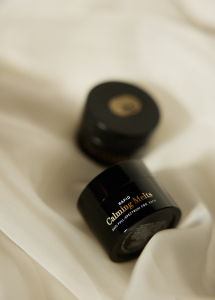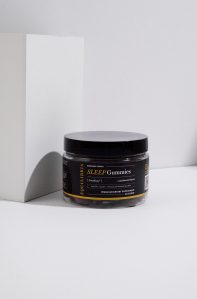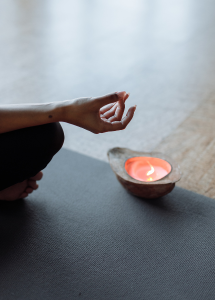Stress Primer

In life, we all face situations that can be stressful, whether they be from family, work, relationships, or the responsibilities of daily life. While certain stressors can oftentimes be dulled or avoided altogether, other stressors are harder to fight off and risk becoming chronic. Our biological responses to this type of stress can affect our physical and mental health.
 Enter the EQ Stress Primer, where we’ve compiled a set of realistic, attainable habits that you can adopt in order to relax and unwind whenever you feel that pressure beginning to build. The Stress Primer focuses on helping to alleviate three key types of stress (Life Stress, Work Stress, and Physical Stress) to keep your mind and body calm, even, and on track.
Enter the EQ Stress Primer, where we’ve compiled a set of realistic, attainable habits that you can adopt in order to relax and unwind whenever you feel that pressure beginning to build. The Stress Primer focuses on helping to alleviate three key types of stress (Life Stress, Work Stress, and Physical Stress) to keep your mind and body calm, even, and on track.
But first: want to know how stressed you actually are? Take our Stress Test to set your baseline.
How to Identify Your Stressors
The first step in managing stress is to actually identify your main stressors; these can include things such as work, relationships, finances, health issues, and so much more. Once these stressors are identified, you can start developing a plan to manage them. To identify your stressors, think about your reactions to certain situations. What makes you feel angry, tense, worried or irritable? Do you often get headaches or an upset stomach when dealing with certain situations, or when you’re in a specific environment? Writing down your “stress triggers” can be a good way to find patterns within your stressors, and help you create a plan to help manage your stress.
How to Create a Stress Management Plan
 A stress management plan is a personal roadmap that outlines how you will manage stress in your own life. This will vary from person to person, but should include specific strategies for identifying and managing stressors, as well as for taking care of yourself. Follow this rough outline for creating your own stress management plan:
A stress management plan is a personal roadmap that outlines how you will manage stress in your own life. This will vary from person to person, but should include specific strategies for identifying and managing stressors, as well as for taking care of yourself. Follow this rough outline for creating your own stress management plan:
- Identify your stressors: as we discussed in the section above, identifying your stressors is the first step in managing your stress.
- Brainstorm solutions: This is where our Stress Primer comes in. What may work for some might not work for others, so brainstorm what you can do to reduce or eliminate your stressors. Try out a few hacks from our Primer, and find what works best for you.
- Create a schedule: Make a schedule for yourself that includes time for relaxation and stress-management activities. Prioritize this time to focus on yourself and what makes you feel happy and relaxed; pencil it into your calendar as you would for a meeting or class.
- Be consistent: It’s important to be consistent with your stress management plan, but life happens and we all slip up every now and then. When that happens, take a beat, and then get back on track – you’ll thank yourself for it.
Practice the Four A’s of Stress Management
When handling predictable stressors, we really have two options – we can either change the situation, or change our reaction. When deciding which path to take during a stressful situation, think of the Four A’s: Avoid, Alter, Adapt, and Accept.
Avoid unnecessary stress.
Learn to say no, avoid people who stress you out, and take control of your environment.
Alter the situation.
Be willing to compromise, create a balanced schedule, and surround yourself with people who make you feel relaxed and comfortable.
Adapt to the stressor.
Some stressors we can’t change, and need to just learn how to deal with them – practice reframing problems with a positive mindset, adjusting your standards to be more realistic, and looking at the big picture.
Accept the things you can’t change.
Look for the upside in stressful or upsetting situations as best you can, don’t try to control the uncontrollable, and learn to forgive.
Now that you have the basis of stress management down, dive into our Stress Primer below for practical, attainable ways to take control of your stress!
For Everyday Life Stress…
Practice Self-Care
 We all have different ideas of what self-care means. For some, it’s unwinding with a face mask, a hot bath (followed with our Relief Balm!), or a cup of mint tea after a long, stressful day. For others, it’s going on a long run and treating yourself to a green juice. It doesn’t matter which version of self-care you subscribe to as long as it makes you feel good. Doing something nice for yourself in times of high stress is a way to reconnect with your mind and body, even when your brain may be running in a million different directions.
We all have different ideas of what self-care means. For some, it’s unwinding with a face mask, a hot bath (followed with our Relief Balm!), or a cup of mint tea after a long, stressful day. For others, it’s going on a long run and treating yourself to a green juice. It doesn’t matter which version of self-care you subscribe to as long as it makes you feel good. Doing something nice for yourself in times of high stress is a way to reconnect with your mind and body, even when your brain may be running in a million different directions.
Take Breaks from Social Media/News Outlets
We know, we know – you’ve heard this a million times. While it’s difficult to put down the phone and close out the Instagram app, the constant doom scrolling and comparisons to others online really can (and does!) take a toll on your mental health. And while it’s always good to be informed about what’s going on in the world around you, it can be really difficult to have a constant influx of bad news all the time, especially when you are already feeling overwhelmed with situations in your own life. So take time to unplug – set a social media timer on your phone, or download this app that delays distracting apps and websites by making you play a short game or take a deep breath before determining if you really need to open TikTok again today.
Connect with your community/people in your life
It’s no secret that strong social support can improve resilience to stress. Pick up the phone and call a friend you haven’t spoken to in awhile – use this time to catch up and forget about your stressors, or just rant about it all! Some friends or family members may be good at listening and sympathizing, while others may be better at practical help, like covering an afternoon of childcare or bringing over a home-cooked meal. Giving support can also increase positive emotions, so if you have the capacity, reach out to a friend who may be struggling. Join a community group or hobby that you do purely for fun – a book club or knitting circle, a rec soccer team or running group – to get you out of the house and set aside a time for you to focus on something that brings you joy.
Calm Bundle
 The stresses of daily life are no joke and can easily knock you off your game. EQ has the answer – this bundle includes our Daily Softgels, Stress Gummies, and Rapid Calming Melts to bring you fast-acting support for those unexpected stress spirals and targeted relief to keep your mind prepped and ready to manage all the daily stressors that may come your way.*
The stresses of daily life are no joke and can easily knock you off your game. EQ has the answer – this bundle includes our Daily Softgels, Stress Gummies, and Rapid Calming Melts to bring you fast-acting support for those unexpected stress spirals and targeted relief to keep your mind prepped and ready to manage all the daily stressors that may come your way.*
For Work Stress…
Set boundaries when it comes to work and projects
In today’s digital world, it’s easy to feel pressure to be available 24/7, especially if you work remotely. Try to establish strict work-life boundaries for yourself – that may mean making a rule not to check your email from home in the evening, or not answering the phone during mealtimes. We are all different and our jobs require different things, but establishing certain boundaries will reduce the likelihood of work-life conflict and the stress that comes with it.
Track your stressors
 A good way to pinpoint what exactly is causing you the most work-related stress is to keep a stress journal. For a week or two, record your thoughts, feelings and information about the specific environment (including the people involved, the setting and your response) that is causing you to feel anxious or overwhelmed in order to identify which situations create the most stress and how you respond to them. Taking notes can help you find patterns among your stressors, which can help you find ways to cope – if you need help getting started, this Stress Exploration worksheet is a great way to begin identifying your own personal stressors.
A good way to pinpoint what exactly is causing you the most work-related stress is to keep a stress journal. For a week or two, record your thoughts, feelings and information about the specific environment (including the people involved, the setting and your response) that is causing you to feel anxious or overwhelmed in order to identify which situations create the most stress and how you respond to them. Taking notes can help you find patterns among your stressors, which can help you find ways to cope – if you need help getting started, this Stress Exploration worksheet is a great way to begin identifying your own personal stressors.
Ask for help
If you are often feeling overwhelmed and stressed to the point where it is affecting your work and daily life, speak to your supervisor or manager. Employee health has been directly linked to productivity at work, so your supervisor has an incentive to create a healthy, low-stress environment where employees can thrive and do their jobs well. Ask about employee assistance programs, or employer-sponsored wellness resources you can tap into, and lay out a plan for managing stressful projects or tasks with your manager.
Sleep Bundle

Achieve peak productivity and a well-rested mind with our Sleep Bundle! Experience the ultimate sleep and wake-up combo to conquer your days with energy and focus. This dynamic duo includes our powerful Rapid Sleep Melts, designed to ease you into a restful night’s sleep, and our infused Nightly Sleep Gummies, perfect for crushing your to-do list with mental clarity.*
For Body Stress…
Move your body
 Daily movement is a sure-fire way to combat stress, improve sleep, and increase endorphins that help relieve pain and improve your sense of well-being. In one study, adults who participated in moderate physical activity had half the perceived stress as adults who did not participate.[1] Participate in exercise that brings you joy, and make sure your movement makes you feel good in your own body. For some that might be a long run or walk; for others it might be hanging out in downward dog or child pose for a while. Whatever makes you feel like you can unwind and relax will be beneficial to your mental and physical health. Try out this 10 Minute Yoga for Stress and Anxiety, this Guided Run, or turn up the volume on our EQ Dance Break Playlist and have an all-out, 5 minute dance party in your living room!
Daily movement is a sure-fire way to combat stress, improve sleep, and increase endorphins that help relieve pain and improve your sense of well-being. In one study, adults who participated in moderate physical activity had half the perceived stress as adults who did not participate.[1] Participate in exercise that brings you joy, and make sure your movement makes you feel good in your own body. For some that might be a long run or walk; for others it might be hanging out in downward dog or child pose for a while. Whatever makes you feel like you can unwind and relax will be beneficial to your mental and physical health. Try out this 10 Minute Yoga for Stress and Anxiety, this Guided Run, or turn up the volume on our EQ Dance Break Playlist and have an all-out, 5 minute dance party in your living room!
Practice relaxation techniques
When the body is stressed, our muscles tend to tense up – this is almost a reflex reaction to stress, and can lead to tension headaches, back pain and general fatigue over time.[2] You can combat these symptoms with stretches and massages, or check out this video to try out progressive muscle relaxation, a method that has been shown to reduce anxiety and ease muscle tension.
 Practicing relaxation techniques such as deep breathing and meditation (you can check out a guided meditation for stress reduction here) can also allow you to calm your mind and reduce the concentration of stress hormones in your blood.[3] We love the 4-7-8 deep breathing technique – when you’re feeling stressed or overwhelmed, simply breathe in through your nose to the count of four, hold the breath to the count of seven, and exhale through your mouth to the count of eight.
Practicing relaxation techniques such as deep breathing and meditation (you can check out a guided meditation for stress reduction here) can also allow you to calm your mind and reduce the concentration of stress hormones in your blood.[3] We love the 4-7-8 deep breathing technique – when you’re feeling stressed or overwhelmed, simply breathe in through your nose to the count of four, hold the breath to the count of seven, and exhale through your mouth to the count of eight.
Relief Bundle
When stress begins to manifest itself physically in the body, you can turn to our Relief & Recovery Bundle to relax and unwind. This luxurious bundle pairs our powerful Extra Strength Daily Softgels, and our Recovery Roll-On to help your body and mind relax and release after even the most stressful of days.*
There you have it – our fave hacks to help you combat stress and stay cool, calm, and collected, no matter what life throws at you.
Pick out a few hacks to try alongside our targeted stress bundles when you’re really feeling stressed out, and bring yourself back to the best version of YOU.* If you need help getting started with a new wellness routine schedule a free call with our Wellness Coaches today!
*This statement has not been evaluated by the Food and Drug Administration. This product is not intended to diagnose, treat, cure, or prevent any disease.